#unrealistic portrayal of abusive relationships
Explore tagged Tumblr posts
Text
If your only argument for shipping Arthur and John is “well they’re not real” stay the hell away from me.
I’m not even going to get into why IT IS incest. But here’s my take nonetheless:
Shipping incestuous relationships, even among fictional characters, is ethically problematic. It normalizes taboo behaviors and can distort perceptions of healthy relationships. Incest is universally recognized as harmful due to the potential for exploitation, abuse, and genetic risks. Romanticizing such relationships in fiction risks trivializing these serious issues. Choosing to ship incestuous relationships, even in fiction, perpetuates a harmful misconception and undermines the effort to cultivate a respectful and understanding narrative.
Misinterpreting a familial bond between characters raised as siblings as romantic chemistry reflects a misunderstanding of a healthy adult relationship.
It's important to be able to distinguish between different types of relationships. Such as recognizing the boundaries between familial love and romantic love. When people romanticize these sibling-like relationships, it blurs these distinctions. And it creates misconceptions about appropriate relationship dynamics.
This misinterpretation underscores the need for highlighting the role of media literacy in appreciating diverse human connections. Portraying and perceiving these characters' relationship as romantic undermines the value of familial bonds and may foster unrealistic expectations in adult relationships. It's crucial for audiences to acknowledge and respect the various meaningful connections that extend beyond romantic narratives.
I’m sorry if this reads like an essay, but as someone who’s taken media literacy classes in college and grown up in the Superwholock fandom, I have a lot to say on this topic. Engaging with fandoms and media since a very young age has deepened my understanding of how narratives influence societal norms and personal perceptions. It’s fascinating yet concerning to witness how certain portrayals in media can impact a fans interpretations and behaviors.
I want this to be open for discussion, because I think it’s important to promote a healthy and thoughtful consumption of media. As well as contribute to healthier representations and relationships in media and storytelling.
That’s it, goodnight, sleep tight, and be kind.
#arthur morgan#rdr2#red dead redemption 2#ao3#john marston#abigail marston#shitpost#shipping discourse#discussion#let’s discuss#rdr2 dutch#rdr2 fanfic#arthur morgan rdr2#red dead redemption community#red dead fandom#fandom
176 notes
·
View notes
Text
I think a lot of young queers folks (like me. Not trying to be all elderly about this I'm literally a gen z) today need to watch the good oldies about our community.
⚠️: I don't mean, in any way shape or form to insult the newer queer shows/movies. I love SPOP. I love TOH. I read and loved Heart stopper. However, because of the restraint of mainstream media, they have a very... palatable?? way to portray the community. I am NOT blaming the creators (who I'm sure would love to go a bit further down on their portrayals if given the option)
SO! I have nice recommendations that I, personally, enjoy a lot. They're in no particular order.
A classic, for starters. But I'm a cheerleader!: Very campy, barbie-y, funny and free on YouTube. A cheerleader is sent to a conversation camp when her social circle realizes that she might be into girls. (It has a very unrealistic portrayal of conversation camps, though. Very cartoony) my comfort movie fr fr
Priscilla, queen of the desert: A trio of drag queens travel across the desert on a big, old bus. They fight, there's some falling in love. They talk a lot about gender identity, queer childhoods and similar topics. I've only been able to find this one (and most of the ones on this list, since I don't have any streaming devices) on illegal websites. There's very, very direct homophobia, SA, physical abuse, child neglect, yk, the American dream. The queens are the funnier thing ever, the romance plotlines are absolutely delightful and well-rounded. Focuses a bit more on the community itself and interpersonal relationships. All around, a solid 10/10.
Kinky boots: A very prude, engaged man inherits a shoe fabric. He's running out of ideas to stay in business, until he meets a drag queen. Same warnings (and themes!) as the last one. This one has a stronger focus on how the characters become more accepting and how our queen navigates being faced with them. I've rewatched it like a hundred times.
The birdcage (2000's) or le cauge aux folles (1970'): A gay couple runs a drag club. Their son brings home a conservative girlfriend and her family. This is more comedy lenient, but funny as fuck nonetheless.
Paris is burning: this one is a documentary, btw. Focuses on the life of drag queens in the 80's. Nothing I didn't already say on Priscilla tbh.
Saving face: A chinese-american girl that lives in a VERY conservatory and secluded community is trying (and failing) not to fall in love with a ballerina. At the same time, her mother (a widow, how scandalous!) gets mysteriously pregnant and gets kicked out of their family home. This one will hit close to home if you're from any ethnic, homophobic household. Cried a lot. Then cried some more. Happy ending, though!
D.E.B.S: THIS IS THE FUNNIEST, CUTEST MOVIE EVER. It's a full on romance comedy for when the mind is a bit too tired! The main plot is that, in a school of girls being trained to be top-notch spies (very totally spies type) a girl who's the top of her class falls in love with the biggest villainess they ever faced. More of a coming of age thing, that also explores the good old dilemma of choosing what the hell you're supposed to do with your life once you turn 18 (relatable tbh)
And now, for a book (in Spanish, though) we have "Las Malas": Narrated by a trans, poor prostitute. Extremely realistic in its narrative voice, cruel and very hurtful sometimes. This is actually one of my favorite books ever, it's so fucking underrated that I'm going to die if no one reads it. There's EVERYTHING. It genuinely drives me crazy to read this. We have queer moms, a child found in a freezing park, suicides, literally anything happens. I love it.
If anyone has any suggestions PLEASE drop them. I'm begging u
#lgbt#but i'm a cheerleader#priscilla queen of the desert#kinky boots#the birdcage#movies#movie recommendations#idk#paris is burning#queer#lgbt movies
114 notes
·
View notes
Note
wait wait wait wait i just saw ur post abt how u dont think heartstopper is unrealistic and i totally feel the same and i felt crazy for a time thinking it bc it feels like almost no one agrees. if youd wanna elaborate on why u think that at all id love that so much
Yeah so it’s actually fucking insane to me the things people say about heartstopper when you hear them talk about it you’d think it’s a completely different show.
The main thing is they say it’s way too happy/optimistic. They expected or even wanted Nick to not like Charlie back &/or be a homophobic asshole, for Ben to be even worse, for his parents to be worse etc etc. They talk like nothing bad ever happens to Charlie or any of the characters except for small drama stuff and they say that’s not realistic for what queer ppl go through or whatever.
Which is INSANE bc Charlie gets bullied, emotionally abused, sexually assaulted, he self harms, and he develops an eating disorder. Like I don’t know how you can hear someone say the show where THAT all happens is too optimistic and not think they’ve got some sort of internalized or implicit homophobia.
The thing is queer media has primed us as an audience to see a main character like Charlie and expect him to get absolutely beaten into the ground. Which lowkey does happen but not in the way we’re used to. He does get bullied, but we don’t start there and focus on what happened, we start after the bullying and focus on the effects of it. What heartstopper does as a series that’s different isn’t even limiting their portrayal of queer pain, they just don’t fucking milk it. The pain isn’t the point, it’s just part of what they’ve got to deal with. Which imo is way MORE realistic, that is exactly what being queer is like. It’s dealing with this shit and still hoping for and focusing on and working towards things that’ll make you happy, like Charlie’s relationship with Nick.
At the end of the day, I don’t actually blame people for expecting heartstopper to do the same shit queer media has been doing for a long time. But I do think it’s on them for seeing them do something different and instead of examining their own expectations and what that says about the world we live in, they just write the show off as unrealistic.
#tbh I’m starting to think people use unrealistic when they really mean they’re not used to shows doing whatever it is#heartstopper
17 notes
·
View notes
Note
You talked about Spiderman and Izuku's suffering in canon and fics. And hurt/comfort for Izu is a bit rare to find.
But that's not the point ...one trope I loathe is when they use "red sneakers" theory and ... apparently every hero shows up to see Izu being abused by BK and would step in to save but....."oh he has a red sneakers?! Quirkless?! Ewww"
You have no idea how I hate this trope.
It's has no base in canon and....if the idea is to make the heroes look bad...we do have canon for that. Their arrogance is a good start point.
I hate when a fic says "here a hero btw he does lots of crimes" to justify as why a hero wouldn't intervine in seeing Izu being beat up by BK.
Just wanted to rant. Bc I do hate this trope. Quirkless discrimination is just a gimmick and nothing else. Also...even if there is quirkless discrimination it would serve only to shit on Izu bc...what he can do? "Revolution!" Damn, he is a abused and traumatized kid who has no one...the whole "liberator spiel" don't work with him and frankly...the issue of racism is so more deep than "kid makes a cool speech and everyone is cool"
It's just complex nuance that...no one gave much thought.
And again, it's fic. People can write what they want. Not a cop.
Just I think this trope is horrible.
Hi @mikeellee 👋
We all have th right to dislike or like son tropes that exist and I for one have to agree with you as I don't like the use of red trainers = quirkless but I like some portrayals of quirkless discrimination in fics and I do think that the concept of quirkless discrimination makes sense but I don't like the whole red shoe = quirkless thing.
Most ways I have seen this trope be used is to show how a lot of heroes are quirkist and that they don't help quirkless people because they're quirkless which is a bit unrealistic in a way to me. Like canon has better ways of showing how corrupt heroes can be so the whole ignoring people because of red sneakers thing seems idk how to articulate it but bad ig🤷♀️. For example you can have a hero be passive aggressive towards a quirkless individual, or you can the quirkless individual receive weird treatments.
I suppose you are right to saying that there is little substance when it comes to quirkless discrimination because yes in reality there is however, we see a lot of the impacts to being quirkless. Every quirkless character we have seen have all voiced insecurities about their quirklesness and how they feel like they are useless because they are quirkless which is interesting because in some of the fan translations of the first MHA chapter quirks are labeled "individualites" aka what makes someone unique and quirkless people lack that.
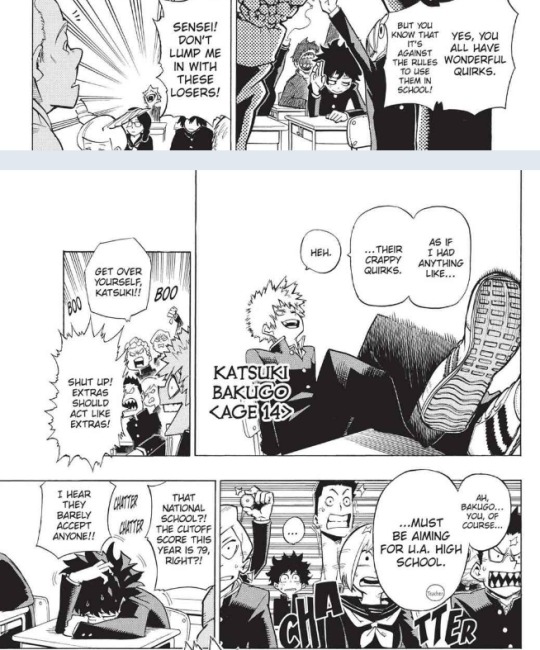
I think Izuku being discriminated adds more to his character especially because the early arcs do show us how that has effected him and how he has 1) no social skills 2) is incredibly attention starved 3) doesn't seem to have a grasp on what a healthy relationship is. All of these set izuku up as a character that needs development and needs to heal. Izuku needs to heal but he also needs to come to the understanding that what happend is wrong and shouldn't happen which would make him understand the greyness of society in a better light while also acknowledging his narration of "nobody is born equal"
Lastly, I don't think Izuku's story should be about him rising and changing and doing all of this on his own but it should be him being the last straw and influencing change.
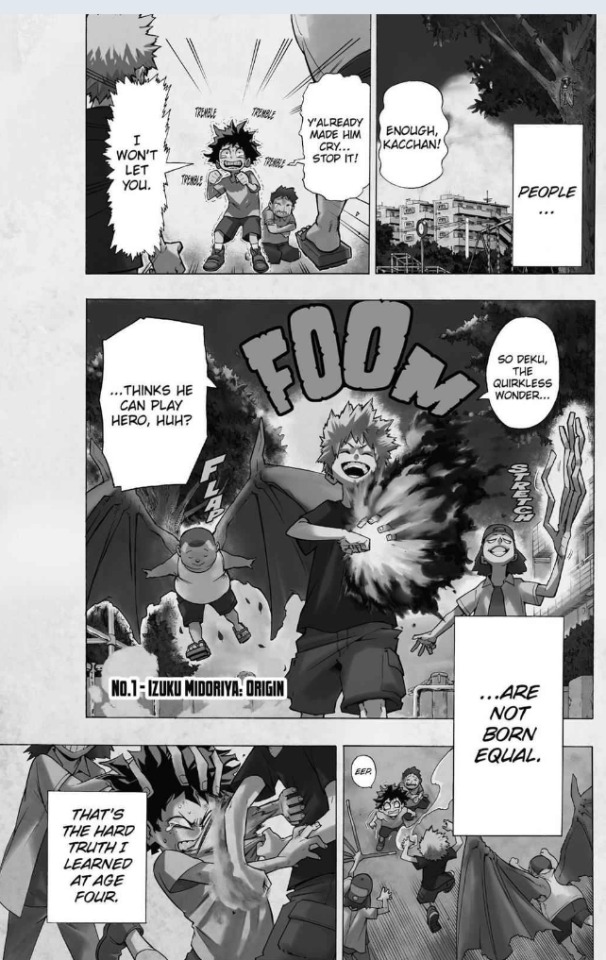
#mha#bnha critical#mha critical#bnha#thanks for the ask#thanks for the ask!#izuku critical#quirkless discrimination#fanon
30 notes
·
View notes
Note
Do you have any tips/guides for writing abusive parents? How they act, and how a fight where they lash out at their child would be? I’m writing a story in which one of the main characters grows up with abusive parents that mistreat her because she doesn’t fit into society’s definition of ‘normal’ (they basically see her as a monster in the literal meaning of the word), and at one point they have a fight because the parents find out that she’s kept a secret close friendship from them for several years, and they snap at her for going behind their backs (despite the parents not really caring about her and what she’s up to normally) while simultaneously being skeptical of their friendship, what it entails, and what being friends with them child says about the friend.
The problem is that no matter how I try to write the scene, it feels dramatized, if that makes sense. I get the feeling that it becomes unrealistic or stereotypical, especially since I know that in abusive households, a lot of the aggression and communication happens without words. I’ve tried researching a bit, but I struggle to find anything that’s relevant, and my childhood struggles were (luckily) not related to abusive parents, so I don’t have many experiences to use as reference when writing.
Resources And Advice For Writing Abusive Parents
Your story sounds really intriguing! I don't have personal experience with this but I asked around and did some research, and I uncovered a lot of interesting facts. If just been looking for a bit of advice/resources, in which case you can scroll straight to the bottom of the blog where I have some resources and niche advice for you.
But, if you, or any other reader for that matter, needs general help in writing abusive parental figures, here is everything I've uncovered thus far.
Understand The Abuser
Most of the blogs I read stated it's important to first understand your abuser. While not excusing the behaviour, understanding the motivations behind the abuser's actions can make your portrayal more nuanced. Abusers often have their own traumas or issues.
Abusive parents can emerge from a variety of traumatic backgrounds, each influencing their behaviour in distinct ways.
Some may have experienced abuse themselves, perpetuating a cycle they learned as children. Others might grapple with deep-seated insecurities, projecting their fears onto their children in an attempt to regain control. Understanding the diverse motivations behind abusive behaviour allows you to create a more authentic and layered portrayal of your characters.
You mentioned your character's parents mistreat her because she doesn't fit in the social norm, so start with figuring out why they're behaving this way. More often than not parental abusers abuse their children because they think they're 'saving' their child from something.
This is a common trend in female relationships, i.e the mother will abuse her daughter in an attempt to 'protect' her from what the mother faced. A mother who faced fatphobia might become an almond mom, etc.
The Motive
Understanding their motive will help you build a reason for their abuse, and then you can create realistic reactions based on that.
Let's continue with the almond mom example. Now, the mother might presume by verbally abusing her daughters and telling them to look/eat a certain way she shelters them from ever having to face this from other people.
If the mother's purpose is to ensure her daughter doesn't gain weight then she would likely have a more subtle abuse style.
So rather than having the mother snatch away the daughter's food in public and eat it for herself, the mother would take her daughter to a food court and fish out veggie bags from her purse claiming that is their lunch.
Maybe she constantly checks the daughter's weight and takes away certain food privileges (carbs/sugar) depending on the changes.
First, figure this out, or if you're having a hard time, you could tell me their motive and I'll help you with some realistic reactions/abuse tactics.
Complex Relationships
One important thing to understand about abusive parents is that at the end of the day. As children, we naturally crave parental approval, an instinct deeply embedded in our emotional fabric. This yearning persists even when we recognize the toxicity of the relationship. The deprivation of affection intensifies our desire for it, leading to a complex interplay of emotions.
In the context of your narrative, consider how your character might unconsciously seek their parents' approval despite the abusive dynamics. The power dynamics are not solely physical; emotional manipulation plays a significant role. An abusive parent's disapproval, expressed through statements like being disappointed or claiming their actions are for the child's benefit, can profoundly affect the abused child.
Perhaps their new friend is teaching them to detach from this mindset, something the parents deeply dislike and thus they want to distance your character from this friend to reinstate their control.
The Emotional Turmoil That Comes With It
Incorporating subtle cues to showcase your character's emotional turmoil can add layers to their experience of abuse. Consider a poignant example: your character choosing to wear a hoodie as a shield against the verbal assaults from their mother.
Perhaps on a day when they wore a hoodie, their mother made a disparaging comment, implying that concealing certain features made them appear more "normal." This traumatic incident could prompt your character to adopt hoodies as a protective barrier against the verbal onslaught, highlighting the lasting impact of emotional abuse.
Abuse vs Negligence
Exploring the nuances between abuse and negligence is crucial for creating a realistic portrayal of an abusive household. While physical and verbal abuse may be more visibly evident, neglect can be equally damaging, leaving lasting scars on a child's psyche.
Negligence encompasses a range of behaviours where parents fail to fulfil their responsibilities. This could involve emotional neglect, where a child's emotional needs are consistently ignored or dismissed. It might manifest as a lack of guidance, support, or affection, creating an environment where the child feels invisible or unimportant.
Moreover, neglect can extend to physical care, where parents neglect their child's basic needs, such as nutrition, hygiene, or medical attention. This form of neglect can have severe consequences on a child's health and well-being.
In your story, consider how neglectful behaviour intertwines with the abusive elements. Maybe the parents, consumed by their own issues, consistently overlook your character's struggles, reinforcing a sense of isolation and abandonment.
This interplay between neglect and abuse can deepen the emotional impact on your character and provide a more comprehensive portrayal of their traumatic experiences. It can also help you build a more meaningful tie with this friend. Maybe your character befriended this friend at a time when they felt abandoned and rejected by everyone, including those who were supposed to care for them the most.
Manipulation
In the realm of abuse and negligence, manipulation becomes a powerful tool that abusers often wield to maintain control. It's essential to recognize the subtle ways in which manipulation seeps into the dynamics of an abusive relationship.
Manipulation in neglectful situations might involve gaslighting, where the parents distort the child's reality or dismiss their feelings and experiences. This psychological manipulation can make the child doubt their perceptions and question the validity of their emotions, further intensifying the emotional toll.
Abusers may use manipulation as a means to deflect responsibility, shifting the blame onto the child for their own neglectful behaviours. This can create a warped sense of guilt and shame within the child, fostering a belief that they are somehow responsible for the inadequate care they receive.
In your narrative, explore how manipulation intertwines with neglect. Perhaps the parents employ manipulative tactics to downplay the severity of their neglectful actions, creating a distorted narrative that serves their agenda. This manipulation can deepen the emotional trauma experienced by your character, adding layers to their complex relationship with their parents.
General Resources
Here are curated resources to aid you in portraying the complexities of abusive dynamics and crafting a scene that resonates truthfully:
Movies:
Precious (2009): A poignant exploration of abuse and resilience.
Sleepers (1996): Delves into the impact of childhood trauma.
Books:
The Glass Castle by Jeanette Walls: A memoir unravelling the intricacies of challenging family dynamics.
The Color Purple by Alice Walker: A powerful narrative addressing abuse and empowerment.
Real-Life Stories:
RAINN (Rape, Abuse & Incest National Network): Offers survivor stories and resources.
Domestic Violence Hotline: Real-life narratives and support.
Online Articles:
Psychology Today: A wealth of articles dissecting the nuances of abusive relationships.
National Domestic Violence Hotline Blog: Real stories and insightful perspectives.
Approach these resources with sensitivity, understanding that the subject matter can be triggering. Always prioritize your mental health and well-being while navigating the intense world of abusive relationships in your writing journey.
Resources Specific To Your Question
My main advice would be to read personal accounts or case studies of individuals who have experienced abuse. This doesn't have to be real people, it can also be fictional characters. One character who comes to mind is Rapunzel.
Hear me out—just like your character Rapunzel meets Flynn who is someone her mother does not like. The ending of Tangled is a scene that comes to mind. You mentioned a fear of seeming too dramatic, but you could showcase the parents suddenly showing their 'true colours' in order to reinstate control over their child.
This can either backfire and the child realises it's now or never, they need to take a stand, or the child is terrified of the repercussions and gives in. Maybe you could write things like 'and suddenly, she was a five-year-old again, with tears and snot racing down her face as she begged her parents to simply look at her.'
I hope this blog on Resources And Advice For Writing Abusive Parents will help you in your writing journey. Be sure to comment any tips of your own to help your fellow authors prosper, and follow my blog for new blog updates every Monday and Thursday.
Looking For More Writing Tips And Tricks?
Are you an author looking for writing tips and tricks to better your manuscript? Or do you want to learn about how to get a literary agent, get published and properly market your book? Consider checking out the rest of Haya’s book blog where I post writing and publishing tips for authors every Monday and Thursday! And don’t forget to head over to my TikTok and Instagram profiles @hayatheauthor to learn more about my WIP and writing journey!
#hayatheauthor#haya's book blog#haya sameer#haya blogs#writers on tumblr#writer community#writer tools#writer blog#writer stuff#writer wednesday#writer tips#creative writing#writers of tumblr#writerscommunity#writeblr#writing community#writer spotlight#writer things#writing prompt#writing tools#writing stuff#writing#writing life#writing inspo#writing help#writing advice#writing inspiration#writing ideas#writing things#writing tip
103 notes
·
View notes
Text
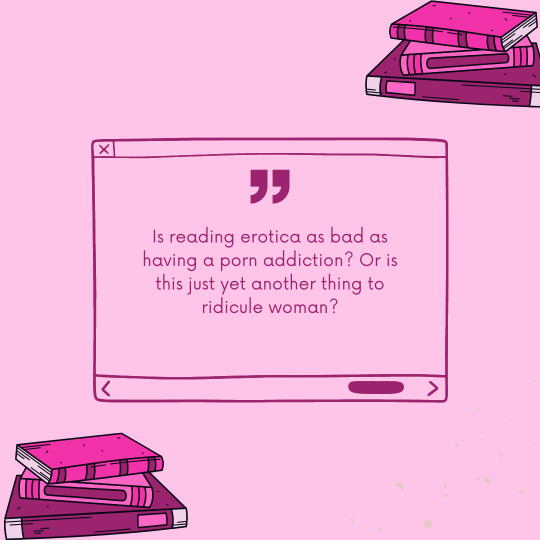
In 2014, it was Amazon who dominated the book industry but now in 2024, it’s who’s emerging as the biggest influencer in the book world. It’s reaching people particularly through a niche called "BookTok," where users review and recommend books. TikTok has a vast and youthful audience, including particularly Gen Z and this has driven the shift to TikTok with BookTok often highlighting explicit and sexually charged literature.
While BookTok introduces readers to a range of books, it frequently features content with graphic scenes and controversial themes, including toxic relationship dynamics and abuse. This trend raises concerns about younger readers, who may be exposed to unrealistic or harmful portrayals of relationships and sexuality without adequate context. Many people note that there are similarities of being addicted to these kinds of sexually charged books and porn addiction. Which is a very interesting thing to claim, especially because the porn industry has been so harmful to women. This not only minimizes how serious a porn addiction is, but it also seems like a very misogynistic attack on a community that consists primarily of women, but there hasn’t been much criticism for the men who read the books. It’s also important to note that books enjoyed predominantly by men never seem to get this kind of attention, books like Game of Thrones, where the sexual content in there is very concerning. Many women feel uncomfortable with the sexual assault and harassment that the women in the series face.
Despite these issues, BookTok has positive aspects, such as fostering reading communities and potentially encouraging new reading habits through TikTok’s personalized algorithm. However, the focus on explicit content and the romanticization of problematic relationships prompt important discussions about the influence of social media on literature and its impact on young readers. What do you think? Is it valid criticism or is it just another thing to ridicule women?
#feminism#feminism is for everyone#accountability#feminism art#feminist books#books#books and reading#booktok
8 notes
·
View notes
Text
Rose rants about / analyzes Wings of Fire - Kinkajou and Emotional Repression
Disclaimer: I haven't reread the WoF books in a while other than consulting Moon Rising for a specific quote or two, so I may get some things wrong. I plan on rereading them soon but life has been kinda busy.
Second disclaimer: I don't have a ton of personal experience with this topic, and I'm really sorry if I screw it up. I wanted to at least try.
First I was going to do a post about Peril. Then I was going to do a post about how I pretty much consider certain events non-canon to my interpretation of the characters. Then I was going to specifically rant about Winter's section of the arc 2 ending. Then I was going to talk about Winter and Kinkajou's relationship. And then I ended up here, with a question that's been bugging me for a while and a line from book 6 that, honestly, makes me a little bit uncomfortable.
The question is this: What is Kinkajou's relation with her traumas, with her fear of NightWings, with the experiments that she went through on the NightWing island?
The quote will be below the read more. Heads up for discussion and/or mentions of emotional trauma, abuse, paralysis, racism, disability, and a quote from the books that, quite honestly, feels like an attempt to play a character's trauma for laughs.
They put me in with a NIGHTWING? hollered her brain. Hello, isn't anyone worried about my potential post-traumatic stress?
I feel like this was mainly an attempt to play Kinkajou's trauma for laughs, which is… ugh. But it also points to a bigger thing about Kinkajou's character- that throughout arc 2, she seems mostly unaffected by the stuff she went through on the NightWing island. There are several points throughout the arc where, in fact, it feels like her past experiences should be relevant and play into the story, and they just… don't.
It feels like Tui's idea in writing Kinkajou is that she's fully recovered and mostly unaffected by what she went through. And this seems… really unrealistic. Everyone deals with things differently, but being able to just shrug off the kind of stuff Kinkajou went through over the course of… a year? idk how long the time gap between books 3 and 6 is. also that gets into the issue of dragons aging faster than humans so maybe that's more like 3 years for her or something idk (definitely gonna talk about THAT topic later if i remember to) but regardless! I feel like you'd expect there to be some symptoms that kinkajou has other than one lighthearted thought and "a hint of anxiety around the edges that her waking mind normally wouldn't allow in" in her dreams.
Although I dislike it, I think there is a bit of a silver lining to it. It emphasizes Kinkajou's belief in the goodness of other dragons, even despite what she's been through, and her determination to go on believing in others and being hopeful. (Of course, this is NOT contradictory with a portrayal of Kinkajou where she struggles more with PTSD.) Which… honestly, is really heartwarming to think about. It also makes her an interesting foil to the rest of the arc 2 protagonists, all of whom struggle with either deeply entrenched beliefs that other dragons cannot be trusted, or with a strong fear of other dragons for one reason or another, to the point that it guides their actions. Moon is convinced that she has to hide her powers from everyone. Winter is convinced he has to be strong, independent, and untrusting of everyone who isn't an IceWing (and possibly of other IceWings too, since he's competing with them for his position in the aristocracy.) Peril is, quite frankly, justified in believing that she can't trust other dragons since most of them, as of the start of arc 2, DO consider her to be a monster who deserves to die. Turtle hides his powers because he doesn't want to end up becoming a pawn for his magical powers. Qibli is constantly skeptical of others, overanalyzing their actions (at least in part due to his abusive birth family who basically forced him to develop it as a survival skill.)
Of course, this contrast isn't really explored much either, but it has a lot of potential. Kinkajou could be a part of each character's journey to learning how to live with their fears and experiences. (And again, this could happen even with other interpretations! This is just an aspect of her character that gets emphasized by the way she's written in the books.)
So what would it look like if Kinkajou isn't as well-adjusted as Tui seems to portray her? What if she's still struggling a lot with her trauma? As a matter of fact, I don't think this interpretation necessarily conflicts with canon. After all, Moon is a mostly-inexperienced mind reader. It's very possible that she's only seeing some of the thoughts of other dragons, and is particularly unreliable when it comes to picking up on their emotions. Maybe the stuff that Kinkajou thinks is her trying to convince herself that everything is ok, even if she feels like it isn't. Maybe the hint of anxiety in her dreams is a lot more prevalent in her mind than Moon realizes.
And once Kinkajou finds out that Moon has the ability to read minds, she would of course double down on these behaviors. She doesn't want to hurt Moon's feelings, so she keeps pushing her anxieties down, convinced that if she lets herself be open about what she feels and thinks, it'll just hurt the people around her and make everything worse.
Maybe Kinkajou starts to see herself as the emotional support pillar of the group, dedicated to keeping everyone else cheerful, and feels like she owes it to them to avoid "burdening" them (as she might describe it to herself) with her problems, even though they wouldn't see it as a burden, but she doesn't realize that.
This does take some creative liberties with Moon's abilities, but I think it's a lot more realistic when it comes to Kinkajou's PTSD.
There's also the fact that Kinkajou doesn't really see Moon as a NightWing since she grew up in the rainforest, a fact she openly states to Moon. (Which, speaking of… ouch, thinking about that makes me hurt on behalf of Moon. She's already anxious about not fitting in, and here comes her new best friend with comments about how she's not really a NightWing.) Perhaps the reason we don't see Kinkajou's symptoms more is because she's mentally categorized Moon as not being a NightWing. Maybe that was a sort of workaround for her so that she could deal with having a NightWing as a roommate. Maybe part of why she suppresses her trauma is because whenever her trauma responses do come up, she mentally labels them as being racist and feels guilty for them.
And there's some really interesting ways this could tie into RainWing biology. RainWing scales seem to be able to both reflect their emotions, and able to change color based on how the RainWing wants them to look. Maybe RainWings naturally have experience with repressing emotions in order to keep their feelings from showing up on their scales if they don't want them to, so that people don't know what they're feeling all the time. Especially with negative emotions, where perhaps it would be seen as rude to display a negative response on your scales in response to something someone says. And it makes sense that the stronger the emotion, the harder it would be to repress. So maybe Kinkajou already has experience suppressing her feelings so they don't show up on her scales, and has unintentionally shielded her trauma from Moon's telepathy in the process.
(I feel like there's potentially some interesting RainWing worldbuilding there I might flesh out more at a later date, but anyways! back to Kinkajou.)
And I feel like this opens up a lot of narrative possibilities, and room for Kinkajou to grow and heal. Maybe a series of conversations with Kinkajou gradually opening up more to Moon. Maybe Winter and Kinkajou talking to each other about their NightWing related fears and traumas. Maybe Qibli is the one who notices that something seems off with Kinkajou, if she's suppressing her feelings so that Moon doesn't see them in her mind. After all, I think Moon tends to be even less observant of people's body language than most dragons (since she tends to rely on her telepathy), while Qibli is hypersensitive to small physical details. (I think there's a book 6 conversation along those lines or something, right?)
Actually, speaking of Qibli, that's another great example of stuff being hidden from Moon. Moon barely figures out anything about his family, even though their actions have left all kinds of marks on his mind and personality. Kinkajou could be a similar case, perhaps more deeply repressed. Another example- Sora was trying so hard to mask her feelings from herself, that she hid them from Moon without even trying to.
I'm not saying that this is necessarily the right interpretation. I just think it's an interesting possibility, and adds some depth to Kinkajou's character beyond what's shown in the book. And again, it doesn't necessarily contradict her being a naturally cheerful person! It doesn't mean her belief in other dragons is a lie! It just means that, alongside those personality traits, she's struggling with a lot of stuff that I think she deserves to be able to work through at some point.
It also doesn't help that Chameleon put Kinkajou into a coma for the middle part of arc 2 which took away some opportunities for character development, and then Anemone messed with her emotions by making her fall in love with Turtle (what the hell, Anemone). I'm thinking that if I make a Kinkajou microfic at some point, I might have it so that she wakes up from the coma after a week or so but with her wings permanently paralyzed? And then to rejoin regular canon (if i even want to do that… book 9 is where I feel that arc 2 starts really struggling. Tui took away the limitations on animus magic earlier but it didn't become as big of a problem until book 9 happened) during book 9, Turtle and Kinkajou and Anemone talk, and Kinkajou decides that it would be nice to be able to fly again, and that's where the healing charm comes in so things can still progress similarly. (Which does potentially wade into some issues with giving a character a disability only to magically take it away later, idk… maybe Anemone makes a magical construct to help Kinkajou? still workshopping ideas for that.)
If you read this far, thank you so much! I hope this was at least somewhat interesting, apologies if it wasn't. There's a good chance I'll write more of these in the future (I did say I'd write an essay on the Kinkajou/Winter dynamic a while back, and I still plan to do that).
#wof#wings of fire#kinkajou#moonwatcher#winter#qibli#wof kinkajou#kinkajou wof#wof moon#wof winter#wof qibli#rose talks#rose rants#rose has way too many thoughts on this series#nightwings#rainwings
9 notes
·
View notes
Text
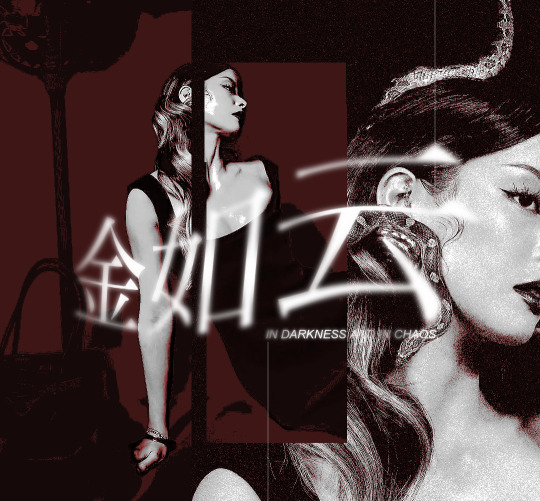
IN THE CREVICES OF BLEDDEN SCALES, 'NEATH THE SCORCHED EARTH OF MOLTEN RIVERS.
A PRIVATE AND SELECTIVE WRITING BLOG FEATURING JIN RUYUN (金如云), ORIGINAL CHARACTER OF ORIGINAL LORE, PRIMARILY SET IN JUJUTSU KAISEN. PORTRAYAL IS DRAWN FROM VARIOUS SOURCE MATERIALS. HEAVY AND EXPLICIT CONTENT PRESENT. AFFILIATED WITH @INMUAKI, @ URL.
DOSSIER & VERSES.
▍18+ only. mutually exclusive. softblock when breaking mutuals, softblock if you don’t intend to follow back because i will forget to unfollow. my activity tends to be low or sporadic, it's never an indication of my interest. i will not adhere to deadlines for interactions - we're mutuals for a reason.
* i utilize memes as a way to write starters and initiate interactions. please do not send prompts if you have no intention of continuing at least one of the ones i post.
▍basic dni criterion apply, but specifically do not interact if you exclusively / primarily use east - southeast asian fcs ( there are exceptions and i can tell when it's weird behavior vs not. i'm east asian and treatment towards east - southeast asians is atrocious. ); interchange asians; write historical or real muses; frequent sexual nsfw; fetishizing mlm. i'm extremely critical of how fandom spaces behave and this extends to the rpc. this is not a safe space for you to be weird and i am confrontational by nature.
additionally: i will not follow if you show a pattern of favoring men and mlm while ignoring women of color and wlw relationships. i don't care if you say you like women when all you show is otherwise. i may not always notice at first, so i will softblock once spotting such behavior. in that same vein, i will not interact with those who endorse nassy ( wellfell, crue11, s4lesman, etc.) and her ongoing romanticization of fictional sexual assaulters, abusers, and general fetishization of asians, including mlm. other trivial problematic behavior include involvement with krp, constant vaguing, and blog - watching.
* by default, expect most potentially triggering content to be referenced in some way or form on this blog. ruyun's story revolves heavily around violence, death, and other explicit content. due to their frequent nature, i only tag visual or highly descriptive content. sexual content may be present, but no smutting on dash unless i'm comfortable, most i'll do is a fade - to - black. regarding shipping, i typically prefer non-romantic dynamics and rely heavily on ooc chemistry to even consider a romantic ship.
▍ruyun is a deaf woman who primarily communicates via sign language. she can speak verbally and by the graces of fiction, can read lips remarkably ( unrealistically ) well. i don't expect every interaction she has to be in sign language or for your character to know it, in fact, i encourage exploration of other modes of communication if your character doesn't know sign language.
* droyi coire and the venkari universe are original lores created by my friends and i. please do not lift or use any of the content.
▍macy, she / her, 25, discord avail for mutuals.
1 note
·
View note
Text
The Impact of Pornography and Platforms like Porn hub
Pornography has been a part of human history for centuries, evolving from artistic depictions to the internet-driven industry we know today. One platform that stands out in the digital age is Pornhub, one of the largest and most well-known adult entertainment websites on the internet. This blog will explore the role of pornography in society, focusing on the influence and impact of Pornhub.
The Rise of Online Pornography
The internet revolutionized almost every industry, and pornography is no exception. With the click of a button, people worldwide gained access to an overwhelming array of adult content. In fact, the adult entertainment industry is one of the most lucrative sectors on the internet, generating billions of dollars annually.
Pornhub, launched in 2007, is at the forefront of this digital adult entertainment. The site’s success can be attributed to its user-friendly design, free access to a vast library of content, and its role in mainstreaming adult entertainment. It provides a platform where content creators, both professionals and amateurs, can upload videos, engage with users, and even monetize their content.
The Dark Side of Pornhub and the Adult Industry
While Pornhub and similar platforms offer a variety of content to their users, the adult industry, in general, is not without controversy. There are several concerns that critics point out when discussing platforms like Pornhub:
Exploitation and Consent: One of the biggest concerns is the exploitation of performers in the adult entertainment industry. Although platforms like Pornhub claim to have guidelines and policies in place to ensure the safety and consent of participants, there have been numerous reports of non-consensual content being uploaded without the performers’ consent. This raises ethical questions about how the industry functions and the responsibility of platforms in preventing such exploitation.
Child Exploitation and Abuse Material: Despite efforts by platforms to combat illegal content, child sexual abuse material (CSAM) has occasionally been found on Pornhub and other adult websites. This has led to public outcry and calls for stronger regulation, better screening processes, and greater accountability from the platform owners. In 2020, Pornhub faced significant backlash after a report revealed that videos featuring minors or non-consensual acts were still available on the site. This led to Visa and Mastercard temporarily suspending payments to the platform, a major blow to its operations.
Addiction and Mental Health: Pornography, particularly easy access to free content on platforms like Pornhub, has raised concerns about the potential for addiction. Many studies have suggested that excessive consumption of pornography can have a negative impact on mental health, relationships, and general well-being. Some individuals report becoming desensitized to sexual stimuli, which can impact their ability to form intimate relationships in real life.
Unrealistic Expectations: The portrayal of sex in pornography is often highly unrealistic, contributing to harmful expectations around body image, sexual performance, and relationships. This can be especially concerning for young people who may not have access to comprehensive sex education and might rely on pornography as a model for understanding sexuality. This could lead to distorted views of consent, body standards, and sexual interactions.
Pornhub's Efforts to Address Criticism
In response to criticism, Pornhub has made several attempts to reform its platform and ensure it operates more responsibly. Here are a few steps the platform has taken:
Content Moderation: Following backlash from various advocacy groups, Pornhub made changes to its content policies. In 2020, they removed millions of videos that were uploaded by unverified users. This was part of an effort to curb the spread of non-consensual content and illegal material.
Partnerships with Advocacy Groups: Pornhub has also collaborated with organizations focused on combating child sexual abuse and exploitation. The platform has committed to implementing more robust verification systems for content creators and working closely with law enforcement agencies to identify and remove illegal content.
Educational Campaigns: Pornhub has launched initiatives like the "Pornhub Cares" campaign, which aims to address some of the negative societal perceptions about pornography. The campaign includes partnerships with health organizations, offering resources on sexual health and safety. The company also claims to take the mental well-being of users seriously, encouraging healthier relationships with the content.
The Future of Pornhub and the Pornography Industry
The future of platforms like Pornhub will largely depend on how they evolve in response to societal concerns, public pressure, and regulatory changes. The adult entertainment industry is in a period of transition, with increasing calls for ethical production standards, stricter regulations, and better protection for performers.
Legislation and Regulation: Governments worldwide are becoming more involved in regulating adult content. Platforms may face stricter laws aimed at reducing exploitation, protecting minors, and holding companies accountable for harmful content. The extent to which Pornhub and similar platforms comply with these regulations will determine their future viability and public perception.
Shifting Cultural Attitudes: Cultural attitudes toward pornography are also changing. While it is still often considered taboo, there is a growing conversation about ethical pornography, which prioritizes consent, representation, and the well-being of performers. Companies that emphasize these values and create a more inclusive and responsible product may be the future of the industry.
Technological Advances: Virtual reality (VR) and artificial intelligence (AI) are becoming more prevalent in the adult entertainment world. These technologies could significantly change the way users experience pornography, further raising ethical and psychological questions. Additionally, the use of AI in creating personalized content could raise new concerns about consent and manipulation.
Conclusion: A Double-Edged Sword
Pornography, especially in the form of platforms like Pornhub, has undeniably reshaped the way society consumes adult content. While it has provided a convenient and accessible outlet for many people, it has also raised numerous ethical, mental health, and societal concerns. Moving forward, the industry will need to balance the demand for content with a greater focus on responsible practices, user well-being, and the protection of those involved in its production.
As the conversation about pornography and its impact continues, one thing remains clear: we must consider both the positives and negatives of this massive global industry to better understand its effects on our culture, relationships, and personal lives.
0 notes
Note
💚: What does everyone else get wrong about your favorite character? 💖: What is your biggest unpopular opinion about the series? 🤍: Which character is not as morally bad as everyone else seems to think?
(x)

I’m not sure if it’s just a trend with characters I gravitate towards or if it’s actually just something that happens with the fnf community at large, but I’ve found that both Ben and Pico, as well as a lot of other characters I like, have traits or sides to their character that are downplayed or ignored in favour of others. For example, Pico is often portrayed in fanon content as either an angsty brooding ass who shows no joy, a miserable longing ex, or a violent crazy ex. Not only is the latter trope with him harmful given his canonical schizophrenia and mental illness in general, but even in FNF’s portrayal alone, he’s already been shown to have more personality than just one or two traits or moods. I’ll admit I’m not immune to angsty pico on my blog when it makes sense, but he’s not constantly angry or sad, he’s got layers and varied moods, like any other person.
I guess my most unpopular opinion about Soft specifically is that even with how much I love the mod, that Ben’s writing could have been handled better. I’m not expecting top tier writing from an fnf mod, a medium where the focus is the music, that’s unrealistic. It’s not that his abuse is mishandled either, his behaviours and thoughts get across the kind of manipulation and dismissal he’s had to put up with for most of his life, it’s more that his personality doesn’t get much of a chance to shine outside of his abuse, which leads to the kind of misinterpretations of him I most commonly see in the fandom where he’s a crying nervous wreck 24/7. Of course, with future updates we could always see more of Ben as his own person now that his parents are assumedly out of the picture, but it’d have been nice in v2 to even just have him express more emotion outside the default of nervous and/or sad more often.
Grace is the easiest answer for this, especially during v1’s era where she was often called clingy or delusional or just there to “get in the way of the ship”. It’s shown more clearly in v2, but Grace’s need to be with Ben isn’t out of clinginess or hatred for his and Pico’s relationship, it’s because she’d been told her whole life that she would be with Ben, and now the rug’s been pulled out from under her all of a sudden, and she can’t cope in the moment. V2 showed the effects that being promised something her whole life that wasn’t guaranteed had on her, and I’m glad that fanon opinion of her has generally swung back around to understand the kind of character she was all along, a victim in different experiences, not just a clingy delusional friend of Ben’s.

0 notes
Text
Peer Pressure and Digital Citizenship: An Unmissable Connection
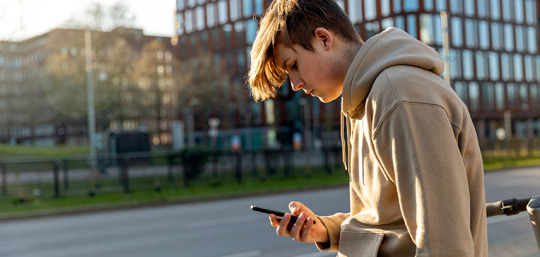
In the digital age, peer pressure has become an increasingly prevalent issue, especially among the youth community. As social media becomes an indispensable part of daily life, understanding the relationship between peer pressure and digital citizenship is crucial. This article will explore how peer pressure affects the online behavior of young people and the solutions for building a positive online community.
Peer Pressure in the Digital World
Peer pressure occurs not only in real-life environments but also spreads across social media platforms. Children and teenagers often feel pressured to present themselves according to certain standards to gain acceptance. According to a study by the Pew Research Center (2021), about 70% of teenagers feel the pressure to post perfect images or participate in online trends to attract attention from their peers. This not only affects mental health but can also lead to poor decision-making.
A prime example today is the social media platform Threads, where users are referred to as “Threads City residents.” The content on this platform mainly revolves around showcasing, from appearances to achievements and even wealth. Many users exaggerate or fabricate what they possess, creating an unrealistic portrayal of life. This pressure is not limited to Threads but is widespread across many other platforms, where people typically share the best aspects of themselves. This leads to feelings of comparison and inadequacy among those who do not meet these standards, clearly creating peer pressure.
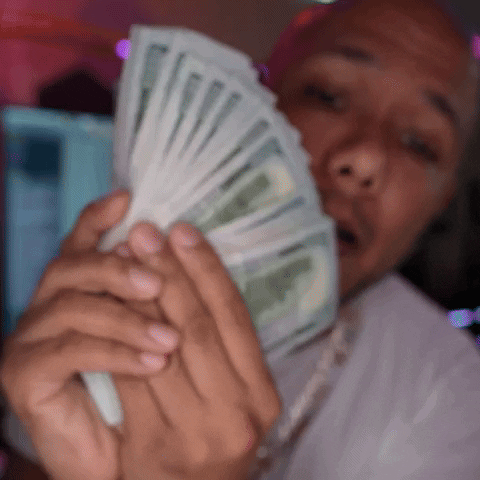
(Threads City)
Potential Dangers
Mental Health: Peer pressure can lead to serious mental health issues. When teenagers feel the need to conform to group standards, they may experience anxiety and depression. The American Psychological Association indicates that young people who frequently face this pressure are at a higher risk of developing psychological disorders. Worrying about not being accepted or being criticized can create a negative cycle, increasing feelings of loneliness and low self-esteem.
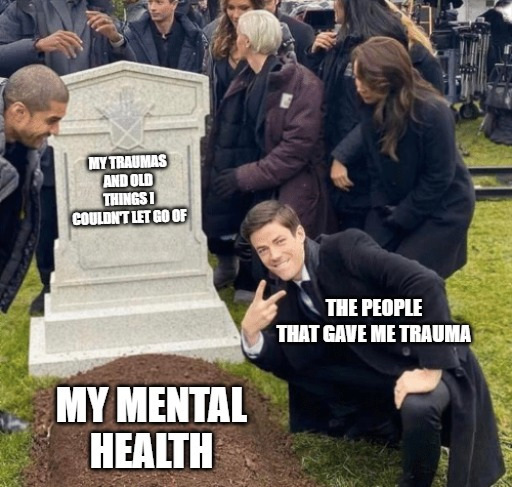
Risky Behavior: One of the greatest dangers of peer pressure is its potential to lead to risky behaviors. Many teenagers feel pressured to experiment with substances like drugs and alcohol to be accepted by their peer groups. According to the National Institute on Drug Abuse, research shows that when friends use drugs, the likelihood of teenagers engaging in such behaviors increases significantly.
Reduced Decision-Making Ability: The influence of peer pressure can diminish the decision-making capabilities of young people. When faced with peer pressure, many teenagers tend to abandon their personal values and choose inappropriate behaviors to gain acceptance. Research from the Journal of Adolescent Health indicates that young people who frequently experience peer pressure are more likely to make poor decisions.
Solutions to Cope with Peer Pressure
To help young people cope with peer pressure, educating them about digital citizenship is essential. Schools should actively incorporate knowledge about privacy rights, online safety, and responsible behavior on the internet into their curricula. Additionally, parents and teachers need to create a supportive environment where children feel confident expressing themselves without adhering to unrealistic standards.
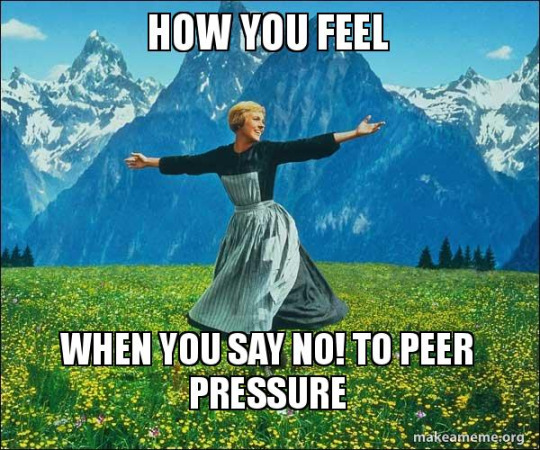
Furthermore, social media platforms should promote campaigns to raise awareness about peer pressure and encourage positive behaviors. Creating online support groups can help children seek empathy and find effective ways to cope with peer pressure, thereby building a positive and healthy online community.
Conclusion
The relationship between peer pressure and digital citizenship cannot be overlooked in today’s digital age. Understanding the negative impacts of peer pressure and seeking effective solutions will help young people develop healthily in a challenging environment.
References list
Pew Research Center. (2021). Teenagers and social media: A study on peer pressure and online behavior.
American Psychological Association. The impact of peer pressure on mental health in adolescents.
Journal of Adolescent Health. Decision-making and peer pressure: A study on youth behavior.
Verywell Mind. (n.d.). What is peer pressure? Retrieved October 13, 2024, from https://www.verywellmind.com/what-is-peer-pressure-22246
0 notes
Text
I agree, but I also kinda disagree about where this stems from. Even before there *were* "well-known queer IPs", this was becoming a problem, but it came from people being burned by media lacking nuance in the opposite direction. You ended up with a lot of "toxic ships", but they weren't exploring anything. They were just abusive heteronormative ships and people were expected to think they were cute. When queer media started to take off, it tended to mirror these exactly because a lot of it was either not by queer people or by queer people who had yet to interrogate their own relationship with heteronormativity, and you ended up with these same flat portrayals.
I think a lot of the people arguing for sanitized media are doing it because they want things that aren't downright toxic, but they don't trust creators who lay a toxic foundation to ever weed out the rot. And I think this is *why* we got the influx of overly sanitized fiction as well. Creators who were tired of all the toxicity tried to push in the opposite direction, but ended up shooting so far in the opposite direction that portrayals are still flat, just "healthy" flat and unrealistic instead of "toxic" flat and unrealistic.
And frankly, I don't think all the big IPs falling into this category is the start of anything. Big IPs follow trends, they don't make them. The big queer IPs fit this trend because people were tired and so everyone flocked to the most sanitized, safest media until they became popular enough that *now* everyone feels obligated to follow suit.
Anyway, I see this sentiment a lot, about how "too sweet" media hurts the community, but I think "too sweet" media is the *result of a hurt community*, not the other way around. I'm also in favor of getting nuanced, complex fiction again, but I think that comes from earning the audience's trust enough that they can make it from beginning to end in complex fiction, but that trust was actively lost, and I think that makes it really hard to win back, especially from bigger IPs where it's impossible to "take risks" because studios want everything to make money before they even begin.
There is a solid argument being made that a lot of the more "mainstream" queer media is sanitized to a point that the relationships are boring and lacking depth, so as to be more appeasing to the aforementioned general population and not potentially "offend" the LGBT community.
It's actually a very important conversation to have, because if I'm being honest, the overabundance of those squeaky-clean, "unproblematic" shows and movies that shall not be named has set back not only the non-queer audiences' view of more challenging LGBT media, but actual queer viewers as well.
And disclaimer, it's perfectly okay to have fluffier, less challenging media to enjoy. But it's almost every well-known queer IP.
It's why you have grown ass adults claiming a queer ship is toxic and bad representation when the ship in question is designed to be imperfect, like a REAL relationship. Like you're supposed to feel nuanced, complex feelings about it. And when you have clearly in progress works that are either setting up to address and remedy these issues, or are simply depicting a bad relationship that happens to be queer, arms go flailing and the creators, who are often ALSO QUEER, are declared homophobic and/or supportive of the "bad" kind of representation.
And it's funny, because so many of the same detractors will claim they want "good" rep. But their definition of good really boils down to, once again, feel-good fluff that they've been conditioned to believe is the norm. And not only the norm, but the better rep. NO!!!!
333 notes
·
View notes
Text
Blog Post #1
Upon its release in 2017, Jordan Peele's Get Out was immediately hailed as a groundbreaking horror film that delved deeply into the subtleties of racial tensions in modern America. My initial viewing of the film was enjoyable but limited in its depth of understanding the meanings behind certain events in the movie. However, after delving into the topics explored in our recent classes, my rewatch of Get Out transformed from a purely a cinematic experience to an insightful commentary on race relations.
To begin, the theme of racial fetishization was starkly evident in Get Out. The Armitage family desired Black bodies for their perceived “genetic benefits” and “trendy” attributes. This grotesque fetishization isn't confined to the movie's fictional universe. In the real world, Black individuals often navigate spaces where they're reduced to mere stereotypes, expected to conform to certain behaviors, or admired solely for superficial or generalized physical and personality traits. This form of stereotyping can lead to unrealistic expectations and can perpetuate harmful notions about racial identity.
Moreover, Get Out delves deeper into the objectification of Black bodies. The Armitage family's insidious plan to transplant the brains of their elderly white relatives into the bodies of young Black individuals was a haunting metaphor for the commodification of Blackness. Black individuals aren't seen as humans with dreams, desires, and agency, but as mere vessels, tools to be exploited for the benefit of white people. This portrayal is a grim reminder of the historical and contemporary ways Black bodies have been used, abused, and discarded.
Perhaps one of the most significant moments in the film to me is its commentary on white women's unique position within the structure of white supremacy. Rose Armitage's character brilliantly showcases this dual privilege. On the one hand, she benefits from white privilege and white supremacy while simultaneously using her femininity as a weapon, especially against Black individuals. The climactic scene near the end of the film where Rose attempts to manipulate a potentially fatal situation to her advantage by painting Chris as the aggressor to the police captures the sinister relationship between white supremacy and femininity. Her calculated response, banking on systemic racial prejudices police have had against the Black community, underscores the many layers of privilege she uses to her advantage.
In conclusion, Get Out is more than just a horror film; it is a critical examination of the intricate racial dynamics at play in contemporary society. By drawing from class discussions and readings, it's evident how the film brilliantly dissects issues like racial fetishization, objectification, and the complicit role of white women in perpetuating racial stereotypes. I look forward to viewing other Black horror films in this class!
1 note
·
View note
Photo
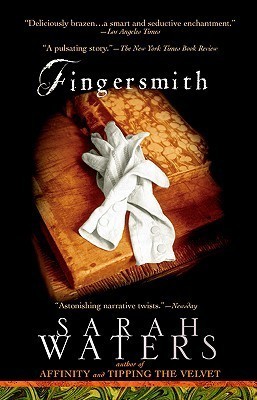
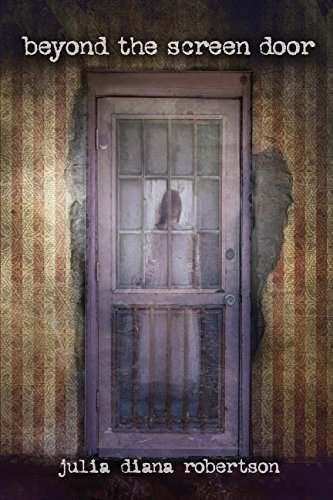
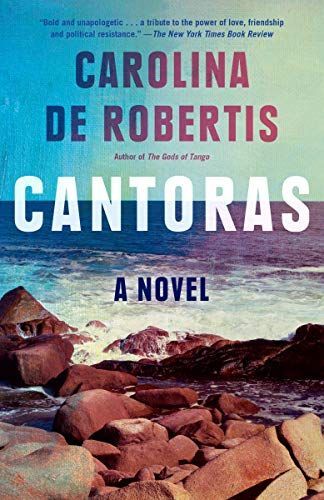
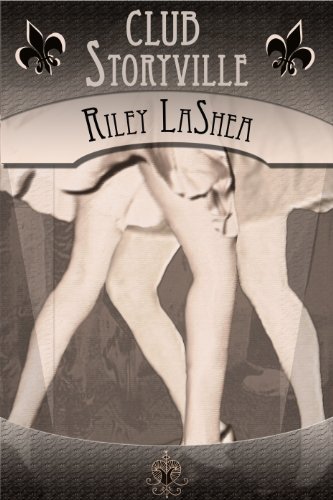
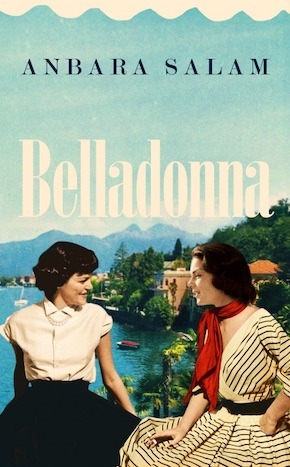
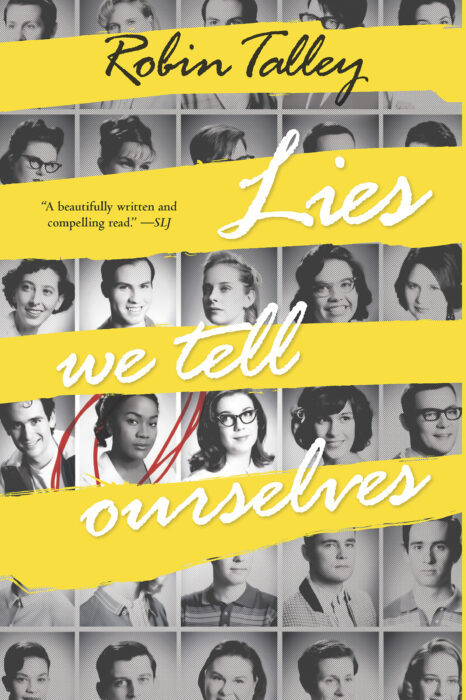
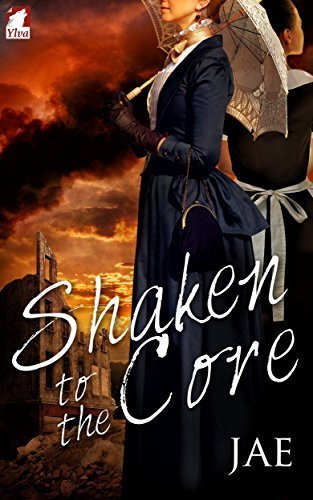


Lesbian Historical Fiction
Fingersmith by Sarah Waters
Victorian England, 1860s. A con artist hires a London pickpocket to help him obtain the fortune of a naïve heiress.
Beyond the Screen Door by Julia Diana Robertson
Washington, USA, 1945. Two best friends grow up together and start to fall in love. One of them can see ghosts, but this is not a scary book.
Cantoras by Carolina De Robertis
Uruguay, 1977. During the military dictatorship, homosexual people were persecuted, imprisoned, and tortured. Five women (three lesbians and two bisexuals) manage to find each other and cultivate a friendship that will last for decades.
Club Storyville by Riley LaShea
Virginia, USA, 1944. A girl raised to be a “proper lady” falls in love with a nurse who comes to care for her sick grandmother.
Belladonna by Anbara Salam
Italy, 1950s. An insecure teenage girl develops a toxic obsession with her beautiful and popular best friend. As the girls graduate high school and attend an art school, their relationship becomes complicated by sexual lust and secrecy.
Lies We Tell Ourselves by Robin Talley
Virginia, USA, 1959. Sarah is one of the first black students to attend her previously all-white high school. She becomes acquainted with a white student named Linda, whose father is a major opponent of desegregation.
Shaken to the Core by Jae
California, USA, 1906. Giuliana, a working class Sicilian immigrant woman, goes to work as a maid for a rich American family. The daughter of the family, Kate, is expected to marry a rich man and have children, but Kate wants to be financially independent and be with a woman. This book is set in the time period of the real life 1906 San Francisco earthquake, one of the deadliest natural disasters in U.S. history, which killed over 3000 people and destroyed most of the city.
Last Night at the Telegraph Club by Malina Lo
California, USA, 1950s. A Chinese-American girl has a lesbian awakening, makes friends with another lesbian at her school, and discovers the vibrant nightlife in lesbian bars.
Matrix by Lauren Groff
England, 1150s. A young French woman named Marie is forced to go to an English convent to become the new prioress. The nuns are living in hunger and squalor when Marie arrives, and when she takes charge she transforms the fate of the convent and the lives of the nuns into something better and more successful than they could have imagined.
Click “Keep reading” for content warnings. Minor spoilers ahead.
Content warnings for Fingersmith: abuse, including child abuse
Content warnings for Beyond the Screen Door: child abuse, domestic violence
Content warnings for Cantoras: abuse, child sexual abuse, corrective rape, marital rape, suicide
Content warnings for Lies We Tell Ourselves: racist abuse. Additional note: This book does not hold back from depicting the racism and homophobia of the time. It has also been criticised for its portrayal of an oppressed person falling in love with their oppressor, and rightfully so because that aspect could have been done better, but at the same time I don’t think that lesbian relationships in books have to always be written as flawlessly healthy and morally pure, just as hetero relationships often are not. If Linda had abandoned all her racist beliefs immediately and rededicated her goals to supporting black civil rights, then the book would have been criticised for being too unrealistic, imo.
94 notes
·
View notes
Note
Ayo, I could be mixing you up with someone else, but what gives you the impression Guts has any romantic feelings for Griffith post-eclipse. Golden age griffguts is valid and all, and still having some sexual attraction is possible, but how the heck could Guts still have any romantic feelings for a guy who condemned all his comrades to a horrible death, the sole exceptions being Guts, who was maimed, and Casca, who was horribly violated and tortured until her mind broke. In addition, Guts also knows all his comrades literally went to hell, so just... where do the romantic feelings come from? I assume it makes sense, I just don't see it.
lol idk if you're confusing me with someone but I definitely do think Guts' post-eclipse feelings are still romantic to an extent, so I'm happy to get into it.
Also just disclaimer, I’m saying these feelings are romantic because there’s a ton of homoeroticism involved in their portrayal, but yk, the point is that Guts still has intense positive feelings for Griffith based on their past relationship when they were both human, and if you see that as super intense friendship all these points still hold true.
Narratively here's a brief explanation of why I think Guts still has romantic feelings for Griffith, in the form of a small selection of blatantly homoerotic post-eclipse panels:
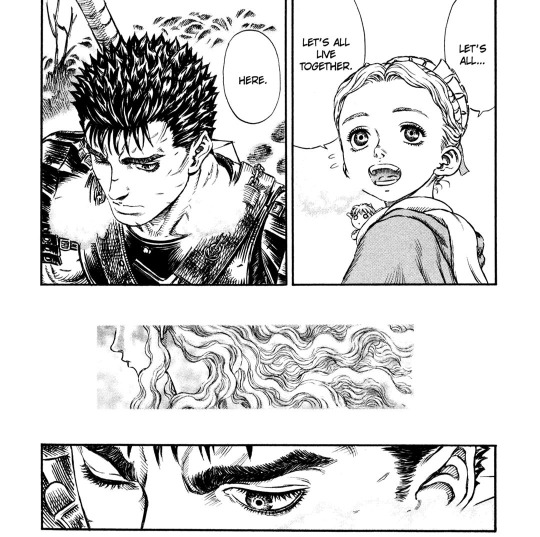
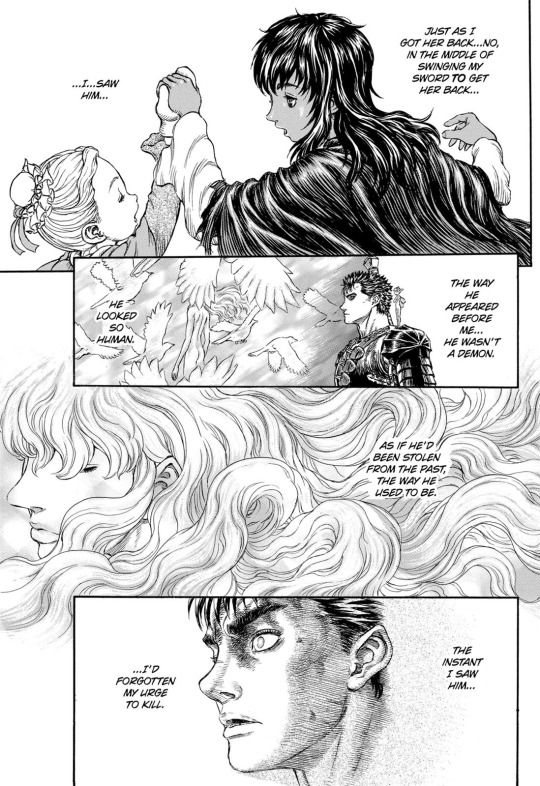
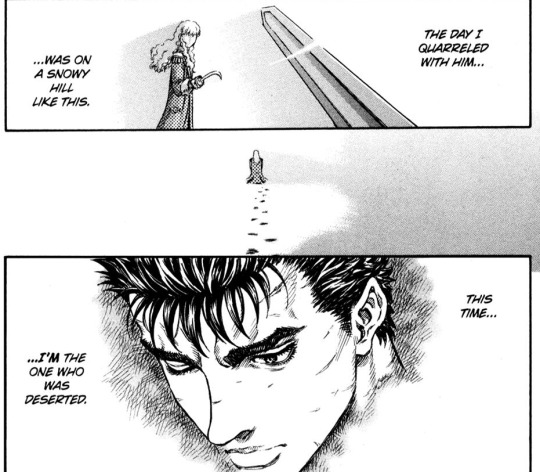
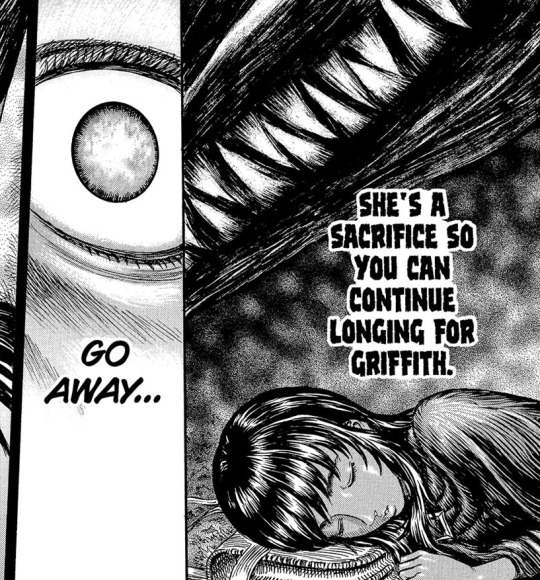
(link to some relevant translation notes of the beast of darkness nightmare scene)
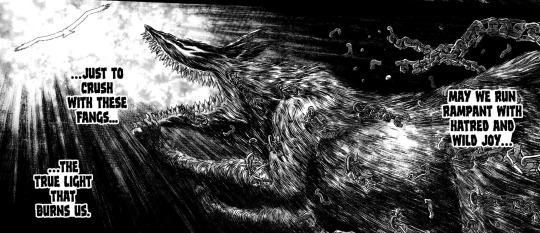
(more posts on why this scene is so suggestive)
Like, the short answer is because Miura wrote those feelings into the story. Whether they’re reasonable or not is neither here nor there, whether it’s fair to Casca doesn’t matter, whether it’s logical is irrelevant. Regardless, Guts’ feelings are canonically mixed, and often blatantly homoerotic.
However, I don’t think it’s implausible. Griffith has undergone two magical transformations. Guts was obsessed with human Griffith, solely motivated by wanting to grow closer to him, and his obsession post-Eclipse is still there, it’s just taken a darker turn. He still wants Griffith/Femto to look at him, he still wants to be his equal, he still craves his attention, and I would argue that that’s Guts’ biggest motivator post-Eclipse.
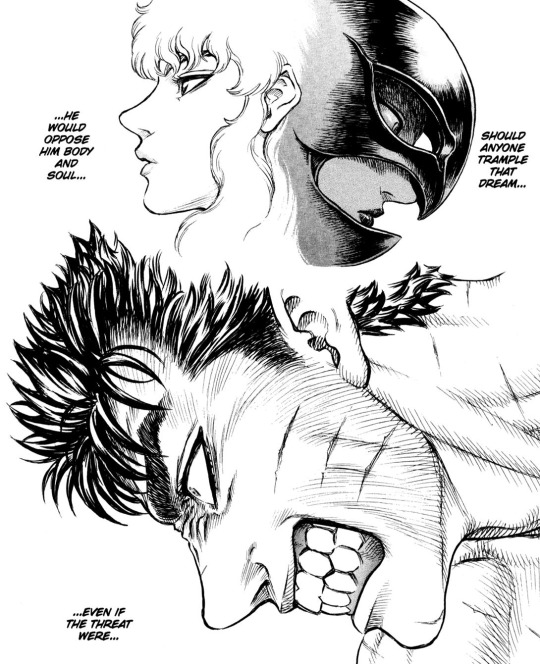
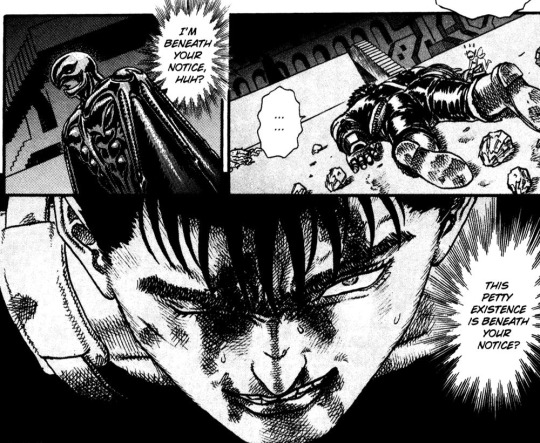
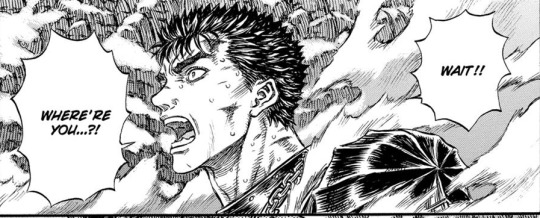
His romantic feelings haven’t disappeared, they’ve just been combined with rage and betrayal.
And this is also perfectly in character for Guts - he never fully hated Gambino, he cried over him nearly a decade after killing him and still felt guilty, and he always remembered Gambino’s good aspects along with the bad. And Gambino was just some asshole with relatively few good qualities, who abused Guts and personally had him raped. Griffith was a genuinely good guy with a mutually loving relationship with Guts (which Guts recognized before the Eclipse happened) until he literally underwent a magical, personality-altering transformation into a demon - which, btw, Guts also partially blames himself for. Why wouldn’t his feelings be mixed? Who on earth would feel nothing but straightforward blind hatred? That would be unrealistic, imo.
Also a few points worth noting:
Guts differentiates between Femto and OG Griffith (”That’s not... the Griffith you know anymore.“) so that also contributes to his mixed feelings. He doesn’t hate original Griffith, and that residual love flavours his feelings towards Femto/NGriff.
His love for original Griffith is what inspires him to rescue Casca in chapter 130 - his regret over abandoning Griffith in the snow makes him resolve to fix his mistake of abandoning Casca too before it’s too late.
Guts’ temptation to become a monster has been framed as a way to get closer to Griffith (not literally but emotionally, btw) and be more like that “friend” (eg chapter 118, 187).
And narratively it’s a much much weaker story if Guts’ Golden Age feelings for Griffith have been entirely subsumed by hatred and are now irrelevant. That’s just bad, shallow, pointless writing. If those feelings, which were the core of the Golden Age, essentially the sole reason the Golden Age exists as part of the story, are irrelevant, then Miura fucked up by making the story revolve around them lol.
Like, the fact is that the story of Berserk is about Guts and Griffith’s relationship, it’s the central theme of the story. Cold facts, this is straightforward analysis. Guts and Casca’s relationship, among all the other relationships in Berserk, is a side thing which serves the main theme of Guts and Griffith’s relationship, sometimes by contrasting it, sometimes by paralleling it, sometimes by being thrown under the bus to emphasize it lol. Every significant narrative decision Guts has made has literally been predicated on his feelings for Griffith and Griffith’s for him: choosing to stay with the Hawks in chapter 16 and chapter 7 after moments of bonding; choosing to leave the Hawks after Promrose Hall to get closer to him; choosing to stay again when he realizes Griffith cared for him all along (chapter 72), his war declaration in response to Femto’s spiteful hatred and betrayal, abandoning Casca in a cave also in response to that, choosing to save Casca in chapter 130 to make up for abandoning Griffith; choosing to ignore Casca being burnt at the stake while trying to confront Griffith at the end of the Conviction arc while Isidro saves her, choosing to stay with Casca and try to get over his obsession when NeoGriffith announces he’s over him and “deserts” him in chapter 182. Hell, even choosing to invite people along with him because his feelings for Griffith inspired him to sexually assault Casca.
The story is introduced to us as a story about the intense, fucked up relationship between two dudes in the Black Swordsman arc, and even when Guts and Griffith are separated and trying to get over each other, that holds true.
So yeah, that’s my take on that. Sorry for all the links lol, I feel like this response stands on its own, but those are there in case you want more thorough explanations for some of these points.
Anyway thanks for the ask! Hope this illuminated my opinion at least.
#ask#anonymous#a#b#griffguts#ship: griffguts#theme: themes#meta#theme: homoeroticism#theme: true light
153 notes
·
View notes
Text
the ableism in the fandom is a whole different discussion and id rather not derail the conversation to talk about the treatment of men/male characters, but just know i pretty much agree with you on that whole front. i have discussed it extensively before here.
although i will say particularly on the treatment of raph that he is actually not feminine at all. he never expresses any interest in feminine presentation and his interests are all jock-like and masculine (if anything his love for stuffed animals and his sensitivity is just,, child-like? like he is a kid and also some people just hold onto their childish interests, esp neurodivergent people and i think raph is very obviously coded that way). he is a portrayal of positive masculinity that gets derailed just because people cannot fathom the idea of a black (coded) man loving his family without being their mammy, i guess. between that and him being so so masculine and being the only one that gets headcanoned to be a trans woman, it all just kind of adds up to some harmful stereotypes. ive seen it done in ways that have been interesting and respectful.
anyways, i am going to come out in defense of kendratello here and say; kendra's actions are so far removed from reality that i dont think its sensible to equate it to abuse unless you specifically rewrote it to be that way. someone you approached once turning out to be a cyber-terrorist and thief who stole your unrealistic sci-fi tech to do crimes and built a gigantic robot to try and murder your crime-fighting brothers is never a thing that has happened to someone in real life. like it's hard to even find an equivalent to that-- and i do think abstraction from reality is a big thing to keep in mind, because it makes shipping it a lot more understandable and justifiable.
not to mention that most of kendra's behavior is a *joke*. its never taken completely seriously or used for dramatic effect. she's not even really a bully to donnie in particular, because if she were, he wouldn't be bantering with her in the way that he does in purple game. he does stress about what she's capable of, and seems to harbor some bitterness about being tricked, but he grins and makes fun of her the first moment he gets, and she seems to visibly get angry because of it. it's really easy to look at the little moments they got and see some mutual respect there.
(also also would like to mention that kendra was openly shitty right out the gate, and donnie was seeing all the red flags and disregarding them, even when april warned him. he is rude all throughout the purple jacket episode, especially to his best friend-- although obviously he doesn't deserve getting his shit stolen, he's not a hapless victim and i wished he'd treat april better LMAO. he would literally do anything but take responsibility for getting himself into this situation because he knows he kind of did it to himself)
you have to understand when approaching a more serious angle of their relationship that rise works under cartoon logic, and is usually not serious. there are things you can pick from when you want to write in a more serious tone, but ultimately sometimes the slapstick will involve near-death or generally unsafe situations-- i dont think splinter is a weirdo evil abuser for what he did at the end of lair games, and characters like draxum have been forgiven despite doing way worse consistently, and being older and much more knowledgeable. i think when you look into deeper character motivations in a cartoon like this, you have to differentiate obviously exaggerated situations from the more serious things (and mind you, draxum is forgiven despite being a much more serious villain who likely gave them very real trauma, leo especially). every situation with kendra is so absurd that i think its unreasonable to portray her that way.
i've never seen a portrayal of kendratello that glorifies any potential abuse between them. usually it is paired with a respectful redemption arc (because kendra's a teenage girl, and people will give backstory and motivations to male characters literally all the time, i see people bend over backwards to justify every bad thing leo and donnie do even if its silly), or if it's portrayed in a more uncomfortable way it's kind of ,,, the point. people can like abusive relationships in stories and acknowledge that theyre abusive. a lot of people like exploring toxicity and im not sure why kendratello is in any way more problematic than something like splinter x draxum. i never see anyone talk about how its actually evil to pick on the obvious romantic connotations because of what draxum did to him.
i just think a lot of people single out kendra and the idea of shipping her in particular because she is a non-white teenage girl. we are all subject to implicit bias, unfortunately. and fiction is fiction, and i think the way people who dont like it try to talk about the shippers is really nasty and bad-faith. you can just not like it.
the rise fandom actually has a gigantic glaring misogyny problem but im not sure if i want to start that conversation right now
104 notes
·
View notes